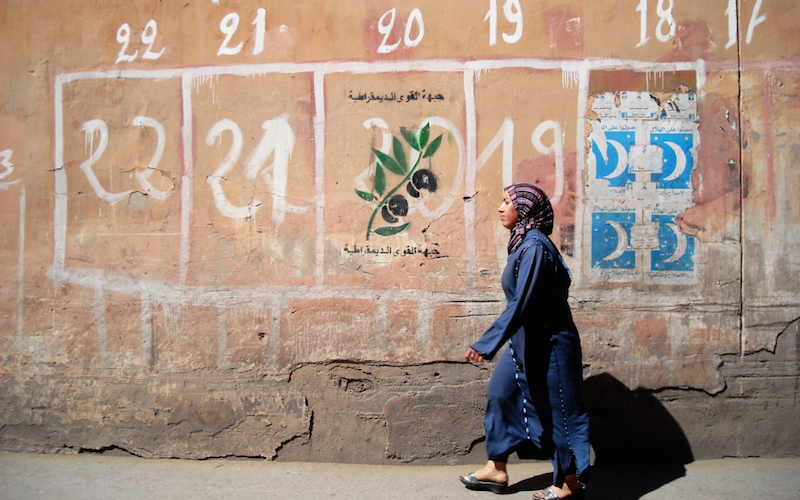
The ‘Mule Women’ of Morocco
Recently the spotlight of world news was and still is on the thousands of migrants waiting in Greece or Eastern European countries to be admitted in the European Eldorado. Many of them come from Syria, escaping war and the persecution to which they are subjected from the inhuman Assad regime and ferocious ISIS. Among, them, however, there are thousands of economic refugees from Sub-Saharan Africa and North Africa, in search of better life opportunities: economic refugees.
At a different European “border” checkpoint, there are hundreds of poor Moroccan women of Amazigh (Berber) background waiting every morning to enter the Spanish enclaves of Ceuta and Mellila to be used as mules porteadoras to transport huge bales of contraband goods into Moroccan territory to be sold in markets all over the country.
According to the New York Times, the city of Melilla alone sells the equivalent of $300 million a year in this cross-border “dirty trade” and this keeps this city afloat economically and justifies the silence of the Spanish government on this gross exploitation of the women of Morocco.
Trade of shame
On the 8th of March, countries around the world celebrate women’s day, but, alas, women continue to be exploited, raped, and abused everywhere and nothing is done to stop that. In Morocco, there are dozens of women associations and human right organizations that meet in posh hotels to discuss different topics over delicious food and beverages and publish pompous reports of achievements for women. They have never brushed upon or talked about the “mule women’s” suffering in an article, let alone struggle to bring to attention their inhuman plight.
The majority of these women are victims of the squalor trinity: demeaning poverty, oppressive illiteracy, and “shameful” womanhood.
In the Rif area of northern Morocco, women continue to be abused because of their gender by crippling tribal culture: they work hard during the day in the fields and at night in connubial beds.
They are often married off at an early age and then are abandoned by their husbands with offspring and have to toil to keep their family alive. Their life is a total struggle for survival and there is total indifference from the surrounding world.
Victims of this trinity, these women come to the border cities to work as “mule women,” knowing that they will be unashamedly exploited by the Moroccan and Spanish commercial mafias. But these destitute women are not only exploited by the mafias, but are also treated like animals by Spanish border police, pushing them, insulting them and beating them. On the Moroccan side, they are not treated any better, and on top of the bad treatment they have to pay bribe money to voracious Moroccan border police and custom officers.
While the trade mafias make millions of Euros yearly on both sides of the border, with little effort and pain, these women have to toil under the burden of huge bales they have to transport from the two Spanish enclaves to Moroccan territory, on a daily basis for a meager pay of 50 dh (the equivalent of 5 Euros).
The “mule women” of the border towns do not have a guaranteed fixed salary and therefore, no health insurance. In doing this work, sometimes there are stampedes at the border gates and some of these women fall and break limbs in the process, and they are immediately replaced by more able women and left to suffer in total indifference by their employers.
Conspiracy of silence and common interest
The shameful exploitation of these poor women has been going on for years and there seems to be a tacit agreement between Morocco, Spain and the European Union to perpetuate this trade of shame and modern economic slavery of poor Moroccan women.
Morocco has done basically nothing to develop the Rif area since independence, basically because this region has throughout history always been rebellious. As a result of the indifference of the central government, the men of the region turned to the cultivation of cannabis, whose resin is exported to Europe. As for women, often the heads of mono-parental families, destitute and stigmatized, they turn to work in trans-border trade knowing that they will be exploited and badly treated, but that is their only opportunity to provide for their children. Official Morocco turns a blind eye to this shameful business because either the government is unwilling to develop the area or it is not a political priority for them, for the time being.
Spain, this European democracy that is supposed to uphold human rights and defend women on its territory and worldwide seems to consider the plight of these women unworthy of its attention, and worse, by so doing, encourages this shameful trade for pure selfish commercial gain that helps keep the enclaves of Ceuta and Melilla afloat and, consequently, under the colonial control of Spain. Spain, nevertheless, refuses to cede these cities and some nearby islands to Morocco and is one of the last European colonial outposts anywhere in the world.
Spain colonized Ceuta in 1668; it is a tiny strip of land of 7.1 square miles and Melilla came under its control in 1479 a few years after the Reconquista and the fall of Grenada in 1492. It is a small strip, also, of 4.7 square miles, but both cities have strategic and commercial importance for this European country.
The European Union considers the last European African colonies as European soil and any military undertaking to liberate these cities by Morocco will be viewed as a military attack on the EU and immediately will lead to action for common defense.
However, the European Union has not sanctioned the Spanish government for the shameful trans-border trade done by “mule women,” though it champions human rights and, especially, women rights and empowerment worldwide. So, not saying anything about this shameful exploitation of non-European women is maintaining a double standard and making a show of hypocrisy to please a member state of the union.
The drama goes on in total shame and silence
While the world at large pretends to defend the rights of women and to fight modern slavery of economic exploitation of defenseless, destitute and illiterate women, the European Union, Spain and Morocco have ganged up, in a shameful manner, to exploit poor Moroccan Amazigh women, away from the spotlight of media and politics. In the meantime, these poor women continue to suffer in silence with no solution in view in the near future, for their inhuman plight.
And while everyone celebrates women’s day on the 8th of March as a symbol of women’s emancipation, the truth of the matter is this is only a pretense because thousands of women around the globe are still under the yoke of shameful exploitation.

